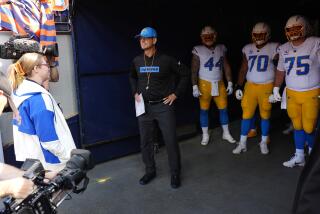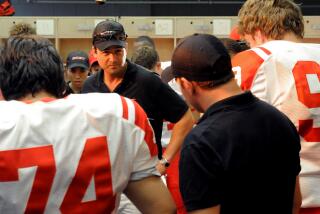Hard times for tough love
Michael Lewisâ slim volume âCoachâ is both a paean to his high school baseball coach Billy Fitzgerald (a.k.a. Coach Fitz) and a reflection on the important role that coaches play in the sentimental education of our children. Lewis encountered Fitz in the late 1970s as a student at Isidore Newman, a tony New Orleans prep school. A two-sport star at Tulane, Fitzgerald had just finished playing in the minor leagues of the Oakland Aâs farm system and was beginning his three-decade stint at Isidore Newman. When this Vince Lombardi-like sports maestro appeared, Lewis and his teammates were a listless and indifferent bunch of baseball players.
That, however, would soon change.
The new era commenced after an ugly loss in which a Newman base runner neglected to hit the dirt on a close play. Though he was mum at the time, Coach Fitz held a post-game workout in which he had the team sprinting from first into a headlong slide at third. At the end of the grueling session, Fitz delivered the edict that team members were not to wash their dirty and now bloody uniforms until they had their first victory.
Young men will jump through hoops of fire to gain the respect of someone perceived as having the authority to bless or curse their sense of themselves as males. A mythopoeic Crescent City athlete, Coach Fitz easily acquired the mantle of this psychic power. In a game that marked the first moment when Lewis realized his abilities, the Newman squad was tied in the last inning of a championship game. Their star pitcher had been tossed and Fitz handed the ball to a shocked and diffident Lewis. But the coach knew what Lewis did not know about himself. Lewis picked off a base runner at third and shut the door on his opponents.
Under Fitzâs tutelage, the Newman team went from being the doormat of Louisiana baseball to a state powerhouse. The effects of Fitzâs intense devotion to his craft, his high expectations and relentless honesty in dealing with his players went beyond the diamond. By Lewisâ reckoning, the strapping coach helped many young men change their yawning attitudes to their highly privileged lives.
But times and values are a-changing. In the last couple of years, some parents at Newman have begun to take issue with Fitzâs abrasive pedagogical approach. One father complained to the administration that Fitz called his son a âfatty,â and some have been calling for his head. Meanwhile, another group of former players has easily raised millions to construct a new gym to be named after Fitz.
Despite the opposition, Fitz is still there. This book, explains Lewis, the author of bestsellers including âLiarâs Pokerâ and âMoneyballâ and a former Times Sunday Opinion columnist, arose from his curiosity about this clash.
Lewis, of course, believes that meddlesome and overprotective parents will stop tough-love practitioners like Fitz from working their magic. He has his point; however, the tales he tells often undermine the lesson that he would have us take from the man who helped to ignite his young life. The author insists that for all of Fitzâs Bobby Knight antics, the final score was not the final score for this coach. It was all about character development.
A few pages later, though, Lewis conjures up a memory of Fitz accepting a second-place trophy and then theatrically smashing it to bits in front of the boys. Maybe there was a motive behind his outburst, but it escapes me.
Lewis returns us to the mound for another story, different from the earlier one of his triumph. Heâs out on the mound melting down. Fitz is fuming at him for having missed a practice to go on a family skiing trip; instead of just telling the young hurler what he was thinking, the team skipper bellows sarcastic comments from the dugout. The distracted Lewis ultimately ends up in the hospital from a line drive smashed back to the mound. Lewis found this hardball experience uniquely edifying, but it is hard to understand why.
This easily flowing narrative establishes the signal point that, for better or worse, coaches wield enormous power with young people. But my long experience in sports tells me that for every Socrates with a whistle, there is more than one mean-spirited martinet. *
More to Read
Go beyond the scoreboard
Get the latest on L.A.'s teams in the daily Sports Report newsletter.
You may occasionally receive promotional content from the Los Angeles Times.










